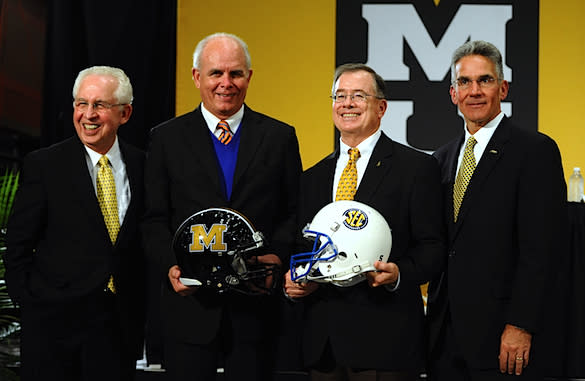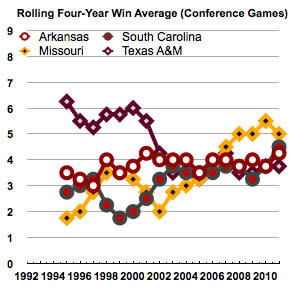12 for ’12: Mizzou, A&M are the same fish in a new pond
Early narratives for the coming year.

• Thesis. After 16 years as respectable, middle-class members of the Big 12, Missouri and Texas A&M;s defection to the SEC will prove to be a lateral move.
• Point. Given some of the projections of doom for the Tigers and Aggies in their new league, you'd think they'd given up a chance to burn path of destruction through the old one. In fact, they're just trading one second-tier niche for another.
Mizzou hasn't won a conference championship since 1969, in the old Big Eight; A&M hasn't won a claimed a conference crown since 1998, its last appearance in the Big 12 Championship Game. That was also the year Mack Brown was hired to resurrect Texas, just ahead of Bob Stoops' arrival at fast-fading Oklahoma in 1999. With the traditional regional powers restored to their traditional glory, A&M spent the last decade playing second banana not only to the Longhorns and Sooners, but also to traditional also-ran Texas Tech, which beat the Aggies seven times out of eight from 2001-08. Before the abrupt midseason turnaround in 2010, the Aggies had gone a full decade since their last top-25 finish in the final polls. It hasn't finished in the top 10 since 1994, in the dying days of the old Southwest Conference. When Missouri landed at No. 4 in 2007, it was its first top-10 finish in almost 40 years, and hasn't been replicated.
After decades of going head-to-head with the likes of Nebraska, Oklahoma and Texas — not to mention short-lived runs into the national elite by conference rivals Colorado, Houston, Kansas State, SMU and now Oklahoma State over the years — neither program is going to see anything in the SEC it hasn't encountered on an annual basis in terms of quality opposition; they're just trading one set of heavy hitters for another. Still, A&M and Mizzou have both have remained competitive and consistent enough to ensure a steady diet of bowl games, with nearly identical records over the last decade as their new second-tier peers in the SEC, Arkansas, Ole Miss and South Carolina, none of which has won the conference since its last expansion in 1992, either.

•Counterpoint. In terms of wins and losses and subsequent spoils, expansion is a zero-sum game: The SEC has added two teams, but hasn't added any more bowl tie-ins or a semifinal round to qualify for the SEC Championship Game or something. As competitive as those spots already are, just being able to (more or less) hold your own in the scrum after devouring a cake-y non-conference schedule in September isn't going to go as far as it used to. Within the middle class, there may be virtually no difference between the fifth and sixth-place teams in the final standings and the ninth and tenth-place teams, but there will be a great divide between postseason opportunities and the fates of certain coaches whose records fall on the wrong side of the coin.
If that happens to be the new kids on the block in their first year or two — and brutal schedules are awaiting both of them, especially Texas A&M in the West Division — it may be a while before the SEC Superiority Complex deigns to acknowledge them as equals. The last time the league expanded, grudging equality only took Arkansas and South Carolina about a decade.
More 12 for '12
Boise State on the backslide
• Noise. Financially, A&M and Missouri are certainly going to be better off than they've ever been in the Big 12: Last year, the SEC divvied up $220 million, or about $18.3 million per school, dwarfing the Aggies' and Tigers' cuts from the uneven distribution plan in their old league. But that was before the Big 12 negotiated a whopper of a deal with Fox Sports and decided to distribute all revenue evenly last October. If they'd remained in the fold through the next round of negotiations for the Big 12's primary television rights, both schools would have eventually raked in at least as much as they'll be making in the SEC, if not more.
• Takeaway. Overheated reputations aside, life in the SEC doesn't figure to dramatically change the Aggies or Tigers' fortunes in either direction. As in the Big 12, A&M and Mizzou both should maintain a steady .500 existence within the conference, experience the occasional peaks and valleys, and enjoy regular trips to second-class bowl games — more or less the same trajectory Arkansas and South Carolina have traveled since joining the league in 1992, and one the Aggies and Tigers should be more than accustomed to.
Of course, that doesn't account for the high of victory-by-association if the SEC continues its success in the BCS Championship Game, or the year-round circus ginned up by the likes of Paul Finebaum and SEC Media Days, the one area in which the conference is clearly miles ahead of the rest of the country. For ego and lowest-common-denominator entertainment value, the move is a step up. For anything you can actually measure, it's just a change of scenery.
- - -
Matt Hinton is on Facebook and Twitter: Follow him @DrSaturday.

